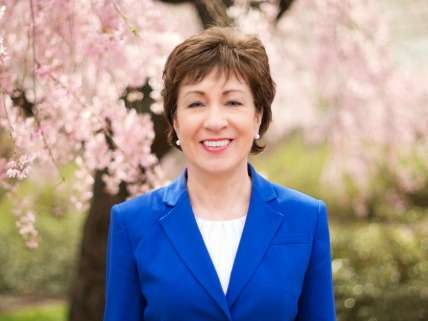Susan Collins' 'No Fly, No Buy' Bill Takes Away Gun Rights Based on Secret Criteria
The Terrorist Firearms Prevention Act relies on an FBI standard we are not allowed to know.

Yesterday Susan Collins' "no fly, no buy" gun control bill survived a Senate motion to table it. That does not mean the Maine Republican's proposal will get an actual vote, let alone that it will be enacted. Civil libertarians should hope it isn't. Although Collins' Terrorist Firearms Prevention Act is not as bad as a defeated amendment proposed by Sen. Dianne Feinstein (D-Calif.) that would have given the Justice Department broad power to block gun purchases based on scant evidence, it still would deprive people of their Second Amendment rights without due process.
Instead of covering anyone the attorney general deems "a threat to public safety" based on a "reasonable suspicion" of involvement in terrorism, as Feinstein's bill did, Collins' amendment focuses on the FBI's "no fly" list, which includes people barred from air travel within the United States, and the "selectee" list, which includes people who must undergo additional screening before flying. Americans or legal residents whose gun purchases are blocked can ask the U.S. Court of Appeals for the District of Columbia Circuit to intervene, in which case the government will prevail if it meets one of two permissive tests.
Under the more demanding test, which corresponds to people on the no-fly list, the Justice Department has to show, "based on the totality of the circumstances," that the would-be gun buyer "represents a threat to public safety based on a reasonable suspicion that the transferee or applicant is engaged, or has been engaged, in conduct constituting, in preparation of, in aid of, or related to terrorism, or providing material support or resources therefor." The DOJ also has to show, "based on credible information," that the rejected gun buyer "poses a threat" of carrying out a terrorist attack. In theory, the latter requirement, which Feinstein's bill did not include, means an old lady who gave money to a Hamas-affiliated charity (thereby "providing material support" for terrorism) would still be allowed to buy a handgun for self-defense unless there was "credible information" that she might also use the gun to hijack an airplane or attack a shopping mall. But it's not clear what counts as "credible information" in this context, and it seems likely that the appeals court, with innocent lives notionally at stake, would err on the side of upholding the attorney general's decision. That's assuming the old lady manages to file an appeal within 60 days, which means laying out money for a lawyer that she will get back only if she wins.
The other acceptable rationale for taking away someone's right to keep and bear arms is both more straightforward and more mysterious. The Justice Department can beat an appeal by showing that "the standard has been met for including the transferee or applicant on the Selectee List," the one that entails extra screening rather than a blanket ban on air travel. And what is that standard? Collins' bill does not say, and neither does the FBI, but we can safely assume it is weaker than the standard for the no-fly list. Presumably the D.C. Circuit would be privy to the FBI's secret criteria if it had to decide whether a petitioner met them, and that information might also be shared with the petitioner's lawyer, assuming he had the proper security clearance.
Surely the Justice Department, given the choice between a more demanding standard and a less demanding one, would choose the latter every time, meaning the security of our Second Amendment rights would hinge on criteria we are not allowed to know. We do know that innocent people can be mistakenly placed on the selectee list (or confused with people on the list, which in practice amounts to the same thing). The ACLU estimates that the no-fly and selectee lists "contain the names of many thousands of innocent Americans" (which seems inconsistent with Collins' claim that the total number of Americans on the two lists is around 2,700). Once your name is on the selectee list, getting excused from the resulting hassle is no small feat, even for famous politicians such as the late Sen. Edward Kennedy (D-Mass.) and Rep. John Lewis (D-Ga.). Yes, that is the same John Lewis who was recently seen at a congressional "sit-in," demanding that other people facing the same predicament not only be treated like criminals when they fly but be turned away when they try to buy a gun.


Show Comments (87)